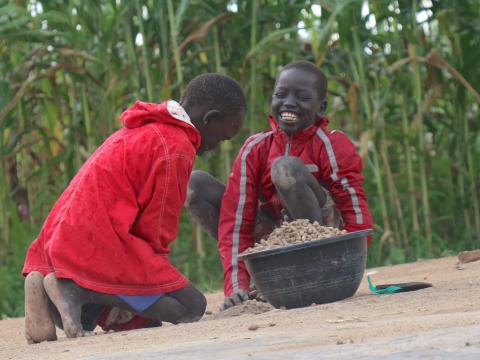Fighting hunger with climate-smart farming methods in South Sudan

“We have been spared from hunger for over a year now,” shares 32-year-old Amou.
Amou and her family live in Warrap State’s Gogrial East County in South Sudan. Her community is a sight to see – all around it is green, and the land is fertile. Yet people suffer from hunger.
The land is vast, but the people lacked the knowledge, seeds, and necessary agricultural inputs,” shares Amou’s mother Mary James.

Amou comes from a pastoralist community, but her family does not own any cows or goats. “My mother would trade the little food we have for milk to prepare for our daily meal that was often prepared to last until the next day,” she shares.
Then the Food Security and Resilience in Transitioning Environments (FORESITE) Project was introduced in the county’s communities changing the people’s outlook about farming. Mary said the community was transformed and everyone became hopeful with their harvests and income.
She is part of a group of 30 farmers that World Vision provided with ox-plough through the cost sharing scheme, five bags of groundnut seeds, and one bag of sorghum seeds.

The FORESITE project, funded by the European Union and implemented by World Vision, AVSI Foundation and the Norwegian Refugee Council, started on August 2019 helping combat hunger and promote stronger food security and resilience.
Mary happily shared that the group harvested 20 bags groundnuts and nine bags of sorghum on the last quarter of 2020 and expects an increase in its harvest this year. “I can proudly say that our livelihood has improved through the project’s intervention,” Mary adds.
I will soon realise the dream of buying them livestock from my savings. I do not want my children to experience hardship as I did growing up.
Working with the farmers, the project aims to enable rural smallholders to improve farm production and empower them to cope with environmental and economic shocks and stresses.
The project has organised 126 farmer groups with total membership of 3,381 farmers, 1,617 of these are women.
“I never imagined farming to be this easy. I am grateful of the tools, seeds, and the training that made work more convenient for us. Indeed the Lord smiled on us using World Vision and partners to rescue us from hunger,” she further says.

Mary's dream is for her children is to own cows and goats. She says, “I will soon realise the dream of buying them livestock from my savings. I do not want my children to experience hardship as I did growing up.”
Amou has enrolled in 2021 and is proud her mother was able to send her to school. She shares, “During the holidays, we help our mother with farm work to help her.”
Mary recalled that July and August were often the toughest months when some people even starve. “We are thankful that things changed. We now grow vegetables to cover the dry season and crops like sorghum and ground-nuts during the wet season,” Mary adds.

Project Director Tesfu Tesfay says, “In an effort to increase agricultural production and food availability in the target areas in Greater Bahr El Ghazal and Warrap states, the project will continue to promote climate smart agriculture practices and technologies.”
Tesfay adds, ”It will continue to link farmers to agri-input dealers so they are be able to easily access products and services on commercial basis, which can minimise the dependency syndrome and ensure sustainability.”
Story and photos by Scovia Faida Charles Duku, Communications Coordinator